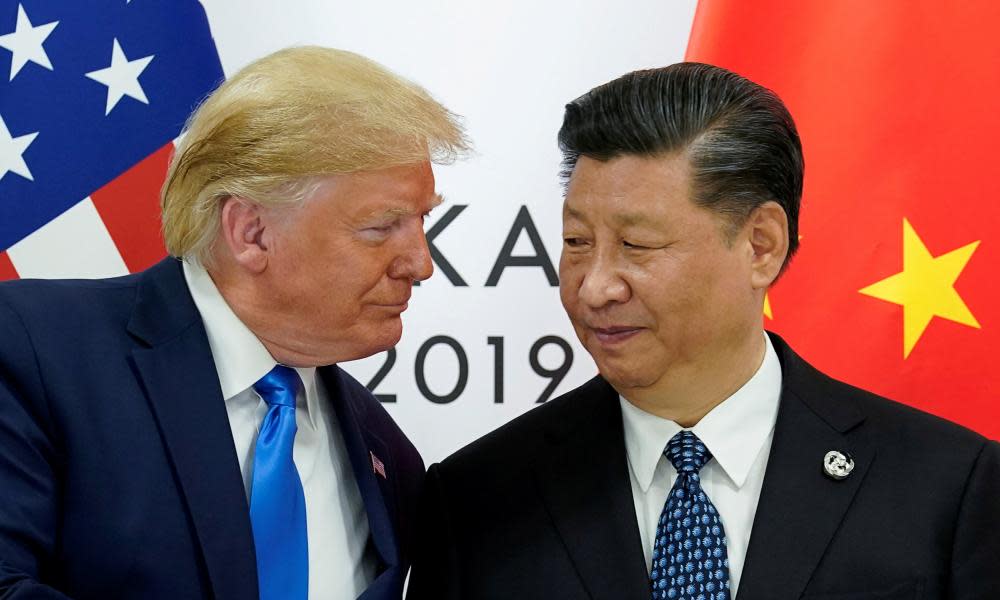Bull, meet China shop: Trump's foreign policy in Asia is disastrous

Asia’s historical, political and economic landmines are increasingly blowing up, and Donald Trump seems intent on accelerating the damage in ways that could threaten US national security and prosperity.
Things didn’t always seem so bleak. Analysts have long heralded the coming of the “Asian century”. Japan, South Korea, Taiwan, Indonesia and others have transformed from autocracies to democratic members of the G20. Today, nations across Asia are innovative economies, flourishing democracies and contributors to global security. Any measurement of GDP size, military might or population illustrate how Asia could be the most important region in the world in the 21st century.
Related: The Hong Kong protests are putting China on a collision course with the west | Simon Tisdall
The future of Asia remains bright, but a crippling array of challenges threatens to upend its potential – and could have an immense impact on the US.
Two of the most successful democracies in the region – South Korea and Japan, which are also US allies – are in the midst of a diplomatic brawl. The tensions are being driven by the legacy of Japan’s occupation of South Korea in the first half of the 20th century – which remains a devastatingly potent political issue in both countries – and starkly divergent approaches to the region from the two current leaders. The countries’ militaries have brushed up against one another, a trade war is under way, and South Korean president Moon Jae-in recently, ominously, said: “We will never again lose to Japan.”
While the US would usually attempt to patch things up, the Trump administration has been mostly absent. A too little, too late effort by the secretary of state, Mike Pompeo, during a trilateral meeting with the Japanese and South Korean foreign ministers reportedly went so poorly that the two foreign ministers canceled their own bilateral meetings with Pompeo. South Korea is now reportedly considering withdrawing from a trilateral intelligence sharing agreement that was the product of intense diplomacy by previous US administrations. Close coordination with Seoul and Tokyo is essential to dealing with North Korea, and this rift could undermine the prospects for diplomacy with and deterrence against North Korea.
That is especially concerning because North Korea has resumed missile testing, sending a reminder of how little recent diplomacy has achieved. And while diplomacy is the only way to address the threat from North Korea, Trump is so invested in the process – and his own narrative that it has been a success – that he can’t even bring himself to criticize Kim Jong-un or the missile tests. In fact, Trump bends over backwards to defend his ongoing bromance with Kim each time the North Korean leader sends another missile message. Meanwhile, North Korea continues building nuclear weapons and advancing its missile technology.
Like with most dictators, Trump also spares his “friend”, China’s president, Xi Jinping, from any criticism, even while escalating a trade war. The trade war, meanwhile, hurts American workers and the US economy, according to the Chairman of the Federal Reserve. If the next round of US tariffs is implemented, some estimate they could cost American families between $700 and $1,270 a year. The incoherence of Trump’s approach on China undercuts American prosperity and has done nothing to advance our goals in addressing genuine problems with China.
Trump also makes clear his willingness to ignore human rights in the hopes of smoothing the way for a trade deal. The people of Hong Kong are standing up for their democratic rights against growing repression from Beijing, and the People’s Liberation Army (PLA) is reportedly massing its forces along the border with Hong Kong while the PLA’s Hong Kong garrison sends threatening messages in what could be a deterrent to protesters or even a prelude to a Tiananmen-like crackdown.
America’s alliances, partnerships and moral authority in the region are fraying
But after talking about the prospects of a trade deal with China, Trump made clear that he doesn’t care about what happens in Hong Kong: “Somebody said that at some point they are going to want to stop [the riots]. But that’s between Hong Kong and that’s between China, because Hong Kong is a part of China … they don’t need advice.” The message to Xi Jinping was loud and clear: All Trump cares about is trade, and he won’t lift a finger if Xi violently cracks down on protesters.
The list goes on. Not long after Trump claimed (falsely) to Pakistan’s prime minister, Imran Khan, that the Indian prime minister, Narendra Modi, asked Trump to mediate the India-Pakistan dispute over Kashmir (the claim itself became a major diplomatic embarrassment for India) the government of India revoked Kashmir’s special autonomous status, raising tensions between the two nuclear-armed neighbors. As the US withdrew from the Intermediate-Range Nuclear Forces (INF) treaty, the US secretary of defense, Mark Esper, stoked new concerns of an arms race in Asia when he suggested the US could deploy new ground-based missiles there. Pompeo recently praised the military-run government of Thailand as “returning” to democracy because it held sham elections. And Trump seems unaware of the atrocities being committed against the Rohingya in Myanmar or the Uyghurs in China. America’s alliances, partnerships and moral authority in the region are fraying.
Trump is an expert at stepping into controversy and making bad situations even worse, and his engagement in Asia is no exception. If these situations continue to spiral out of control, any one of the simmering problems from North Korea to Hong Kong to Kashmir could explode. And that could spell serious trouble for US prosperity and national security.
Michael H Fuchs is a senior fellow at the Center for American Progress, and a former deputy assistant secretary of state for east Asian and Pacific affairs

